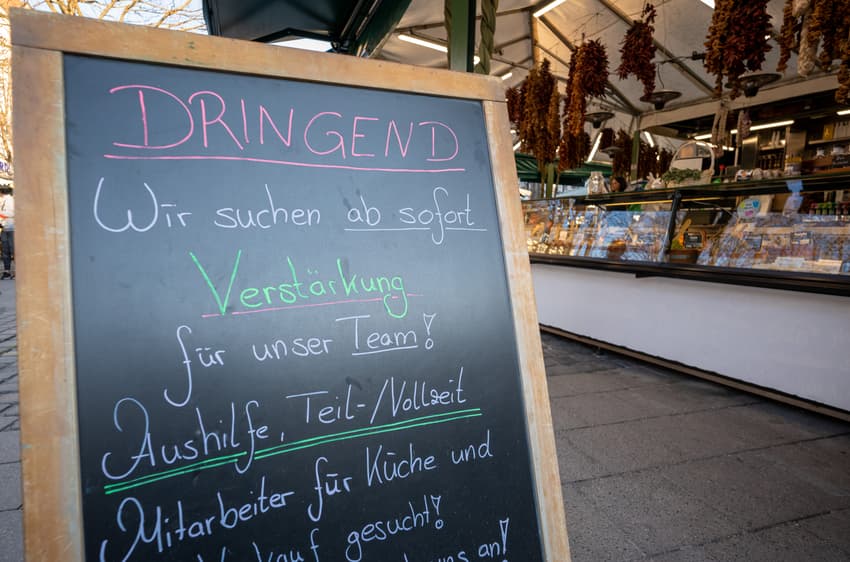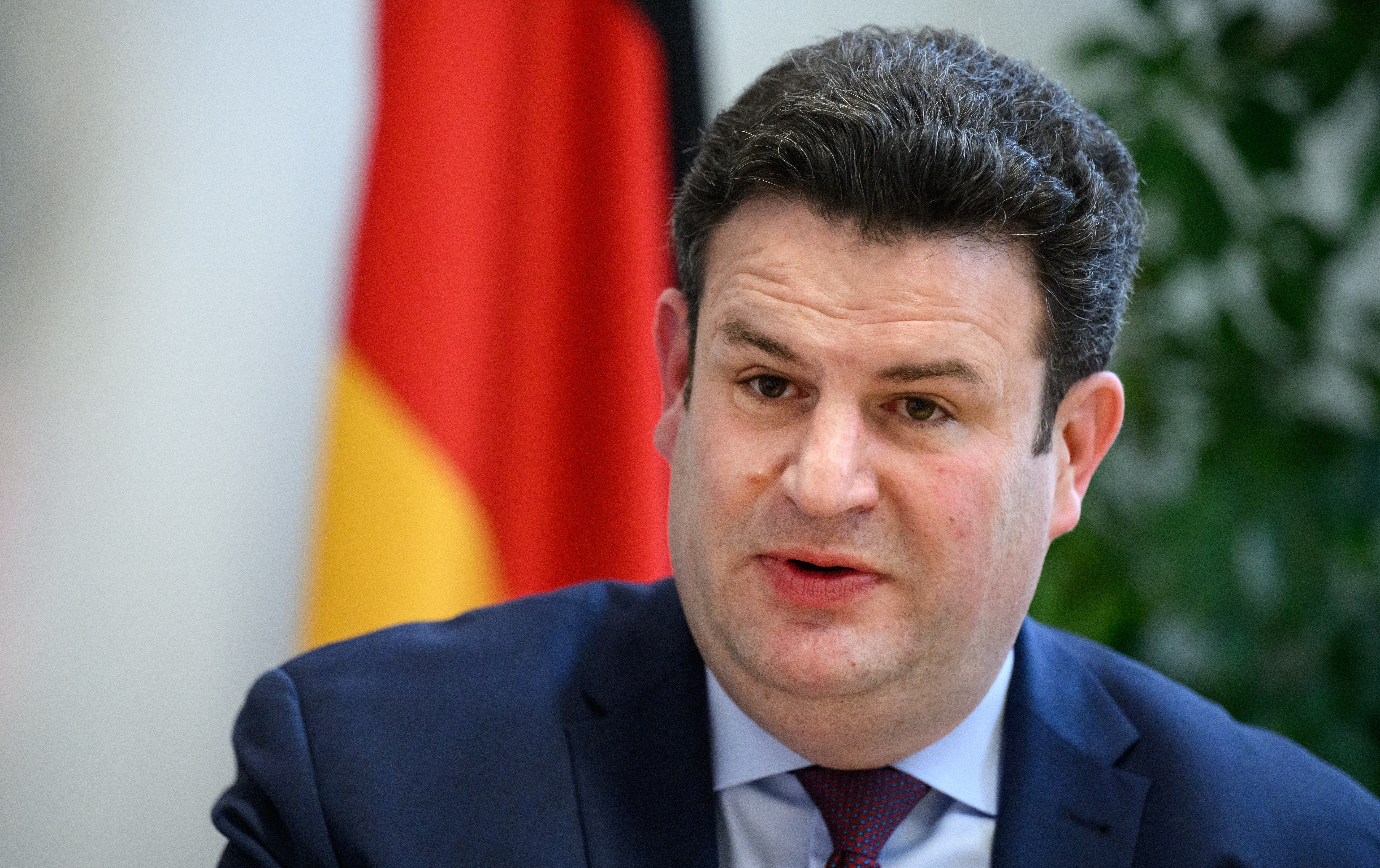Germany will limit impact of Ukraine war on job market, says minister

Labour Minister Hubertus Heil (SPD) has promised the government will take action if the Ukraine war starts to affect the German jobs market.
"We can shield what is foreseeable at the moment in the labour market with a strong welfare state," Federal Labour Minister Hubertus Heil (SPD) told DPA. "If the crisis were to come to a head, we will take additional measures."
In the debate about tightening sanctions against Russia, Heil said that attention should be paid to domestic and social peace in Germany.
"In dealing with the consequences of Putin's terrible war of aggression in Ukraine for the labour market and the economy in Germany, we can learn from the experience of the still ongoing crisis resulting from the Covid pandemic," he said.
The Kurzarbeit scheme, which tops up the wages of employees on reduced hours, has been able to secure millions of jobs and stabilise demand as a "strong bridge over a very deep economic valley", Heil explained.
Since 2020, €44.1 billion has been spent on short-time work, €26 billion of which has come from the reserves of the Federal Employment Agency (BA). Through the scheme, the government managed to avert mass layoffs in the wake of the pandemic.
READ ALSO: Everything you need to know about your German tax return in 2022
"My goal is that we also keep the German labour market robust and stable through this difficult period," the SPD politician said.
In 2022, the Federal Employment Agency expects there to be around 590,000 workers on shorter working hours. This is around 10 percent of the number of Kurzarbeit workers in 2020, when the Covid pandemic first reached Germany.
"At the beginning of the pandemic, we had peaks of up to six million people on short-time work," Heil said. "But we don't know how long this war will last."
Since Russia's invasion of Ukraine, the government has widened the Kurzarbeit scheme to include temporary workers as a means of keeping supply chains running smoothly. Supply chains in Europe have been heavily affected by the ongoing war and the Covid pandemic.
'Hurt Putin more'
Though Germany could still see economic growth of around 1.5 percent this year, a lot depends on whether the war expands elsewhere in Europe and whether the energy supply is affected.
"We don't know what other economic and social consequences this war will have," Heil said. "That also depends on what measures we take in the area of sanctions."
The Labour Minister believes that tougher sanctions should be introduced to increase the pressure on Putin's regime, but he added: "We must always ensure that our sanctions hurt Putin more than they hurt us."
READ ALSO:
- Russia’s alarming hold over German energy infrastructure
- ANALYSIS: How quickly can Germany wean itself off Russian gas?
The government has been heavily criticised - not least by Ukrainian ambassador Andrij Melnyk - for standing in the way of hard-hitting sanctions against Russia's energy sector, even in the wake of the massacre of civilians in Bucha.
German Chancellor Olaf Scholz (SPD) on Friday described the sanctions imposed on Russia so far as "highly effective" and defended Germany's no to an immediate gas boycott.

Labour Minister Hubertus Heil (SPD) gives an interview with the media in Berlin. Photo: picture alliance/dpa | Bernd von Jutrczenka
Responding to a question about whether external security issues should take precedence over social security in Germany, Heil said: "I believe that external strength and security, as well as internal and social peace, are two sides of the same coin."
Regardless of whether Germany agrees to a rapid end to energy imports, Heil said the consequences of the "terrible war" would be felt for many years to come.
Wherever possible, he said, he would do his part to ensure that the consequences for the German labour market were dampened, that price increases were cushioned and that refugees were integrated in society.
"It would not be wise to play off external security necessities against social security," Heil said. "As a society, we must be resilient externally and internally, and our capable and strong state must also live up to its responsibility to protect people both internally and externally."
Comments
See Also
"We can shield what is foreseeable at the moment in the labour market with a strong welfare state," Federal Labour Minister Hubertus Heil (SPD) told DPA. "If the crisis were to come to a head, we will take additional measures."
In the debate about tightening sanctions against Russia, Heil said that attention should be paid to domestic and social peace in Germany.
"In dealing with the consequences of Putin's terrible war of aggression in Ukraine for the labour market and the economy in Germany, we can learn from the experience of the still ongoing crisis resulting from the Covid pandemic," he said.
The Kurzarbeit scheme, which tops up the wages of employees on reduced hours, has been able to secure millions of jobs and stabilise demand as a "strong bridge over a very deep economic valley", Heil explained.
Since 2020, €44.1 billion has been spent on short-time work, €26 billion of which has come from the reserves of the Federal Employment Agency (BA). Through the scheme, the government managed to avert mass layoffs in the wake of the pandemic.
READ ALSO: Everything you need to know about your German tax return in 2022
"My goal is that we also keep the German labour market robust and stable through this difficult period," the SPD politician said.
In 2022, the Federal Employment Agency expects there to be around 590,000 workers on shorter working hours. This is around 10 percent of the number of Kurzarbeit workers in 2020, when the Covid pandemic first reached Germany.
"At the beginning of the pandemic, we had peaks of up to six million people on short-time work," Heil said. "But we don't know how long this war will last."
Since Russia's invasion of Ukraine, the government has widened the Kurzarbeit scheme to include temporary workers as a means of keeping supply chains running smoothly. Supply chains in Europe have been heavily affected by the ongoing war and the Covid pandemic.
'Hurt Putin more'
Though Germany could still see economic growth of around 1.5 percent this year, a lot depends on whether the war expands elsewhere in Europe and whether the energy supply is affected.
"We don't know what other economic and social consequences this war will have," Heil said. "That also depends on what measures we take in the area of sanctions."
The Labour Minister believes that tougher sanctions should be introduced to increase the pressure on Putin's regime, but he added: "We must always ensure that our sanctions hurt Putin more than they hurt us."
READ ALSO:
- Russia’s alarming hold over German energy infrastructure
- ANALYSIS: How quickly can Germany wean itself off Russian gas?
The government has been heavily criticised - not least by Ukrainian ambassador Andrij Melnyk - for standing in the way of hard-hitting sanctions against Russia's energy sector, even in the wake of the massacre of civilians in Bucha.
German Chancellor Olaf Scholz (SPD) on Friday described the sanctions imposed on Russia so far as "highly effective" and defended Germany's no to an immediate gas boycott.

Responding to a question about whether external security issues should take precedence over social security in Germany, Heil said: "I believe that external strength and security, as well as internal and social peace, are two sides of the same coin."
Regardless of whether Germany agrees to a rapid end to energy imports, Heil said the consequences of the "terrible war" would be felt for many years to come.
Wherever possible, he said, he would do his part to ensure that the consequences for the German labour market were dampened, that price increases were cushioned and that refugees were integrated in society.
"It would not be wise to play off external security necessities against social security," Heil said. "As a society, we must be resilient externally and internally, and our capable and strong state must also live up to its responsibility to protect people both internally and externally."
Join the conversation in our comments section below. Share your own views and experience and if you have a question or suggestion for our journalists then email us at [email protected].
Please keep comments civil, constructive and on topic – and make sure to read our terms of use before getting involved.
Please log in here to leave a comment.